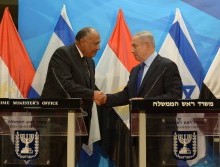
Closer to Arab Peace? Illustrative photo of Israeli PM Netanyahu and Egyptian FM Shoukry. Photo courtesy of by Haim Zach / GPO
Israel and Saudi Arabia aren’t friends and officially don’t have any relations at all, so when a former Saudi general and advisor to the monarchy not only visited Israel but met with officials in Israel’s government, that made headlines. The Times of Israel reported that Dr. Anwar Eshki’s visit was to discuss the Arab Peace Initiative, a take-it-or-leave-it offer of Israel-Arab regional peace if Israel makes peace with the Palestinians.
The report said Dr. Eshki told Army Radio that to his knowledge that Israel and Saudi Arabia do not have a covert counterterrorism relationship as some reports have claimed, saying instead that there will be no Israel-Arab peace until there is an Israel-Palestinian peace deal. Even with that non-cooperative view, one of the major Israeli Arab political parties still condemned the Saudi’s visit as being too supportive of the Israeli government.
Haaretz reported that the party Hadash claimed the visit was part of an effort to undercut the substance of the Arab Peace Initiative and destroy the two-state solution by endorsing Israel. If that wasn’t stern enough, the Arab party then went on to imply that it was troubled by the quiet Saudi-Israel alliance against Iran and various terrorist groups.
“The visit is part of the normalization of cooperation between Saudi Arabia and Israel against Iran, Syria and resistance movements in the region,” said the Hadash statement, according to Haaretz.
Israel, the Times of Israel pointed out, has been seeking to reinvigorate Israel-Arab relations in the hopes that that could be used as a springboard towards peace with the Palestinians, rather than the other way around.
To that end, Israeli Prime Minister Benjamin Netanyahu has heartily welcomed the call to peace with the Palestinians by Egyptian President Abdel Al-Sisi. During a recent visit with Egyptian Foreign Minister Sameh Shoukry, Netanyahu was quoted by his office as saying, “The peace treaty between Israel and Egypt and between Israel and Jordan are the cornerstone of stability in the region, and are critical assets for our countries. They are also the cornerstones of a broader regional peace and a broader stability that we hope to achieve.”
In addition, last year Haaretz reported that Israeli official Dr. Dore Gold, director-general of Israel’s Foreign Ministry, visited the United Arab Emirates as part of a global renewable energy meeting. Israel was also opening an energy office in the Arab nation’s capital city as their representative for the International Renewable Energy Agency, according to the UAE news agency WAM.
While the UAE made it clear that nothing had changed in their nation’s relationship with Israel, it nonetheless was an official trip by Israelis into Arab territory.
Now, a former Saudi official has made his own visit to Israel. Whether that marks positive momentum or just another round of talking remains to be seen.
(By Joshua Spurlock, www.themideastupdate.com, July 24, 2016)
